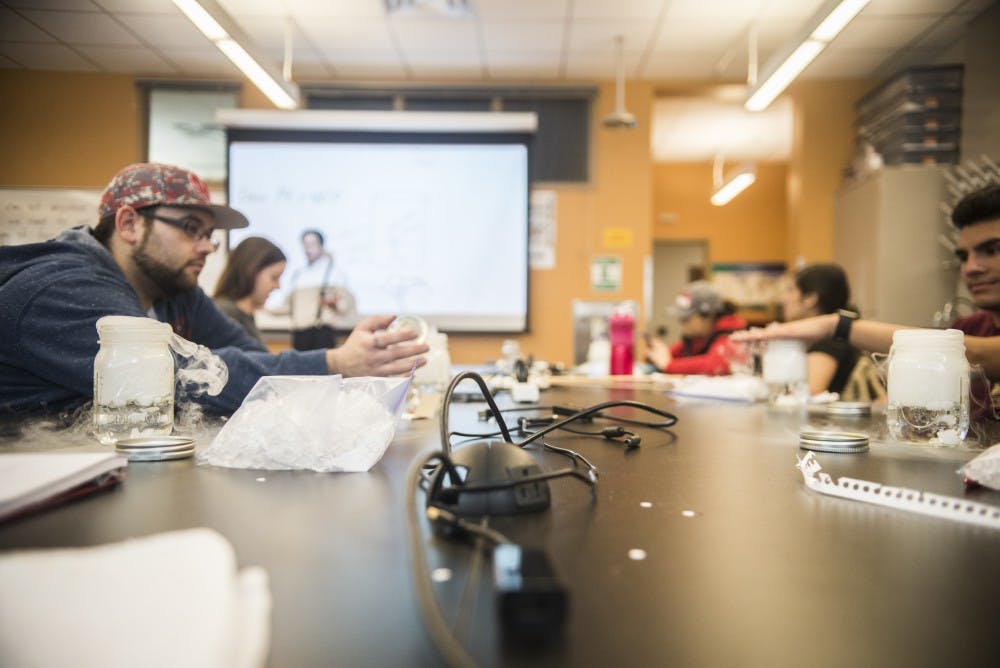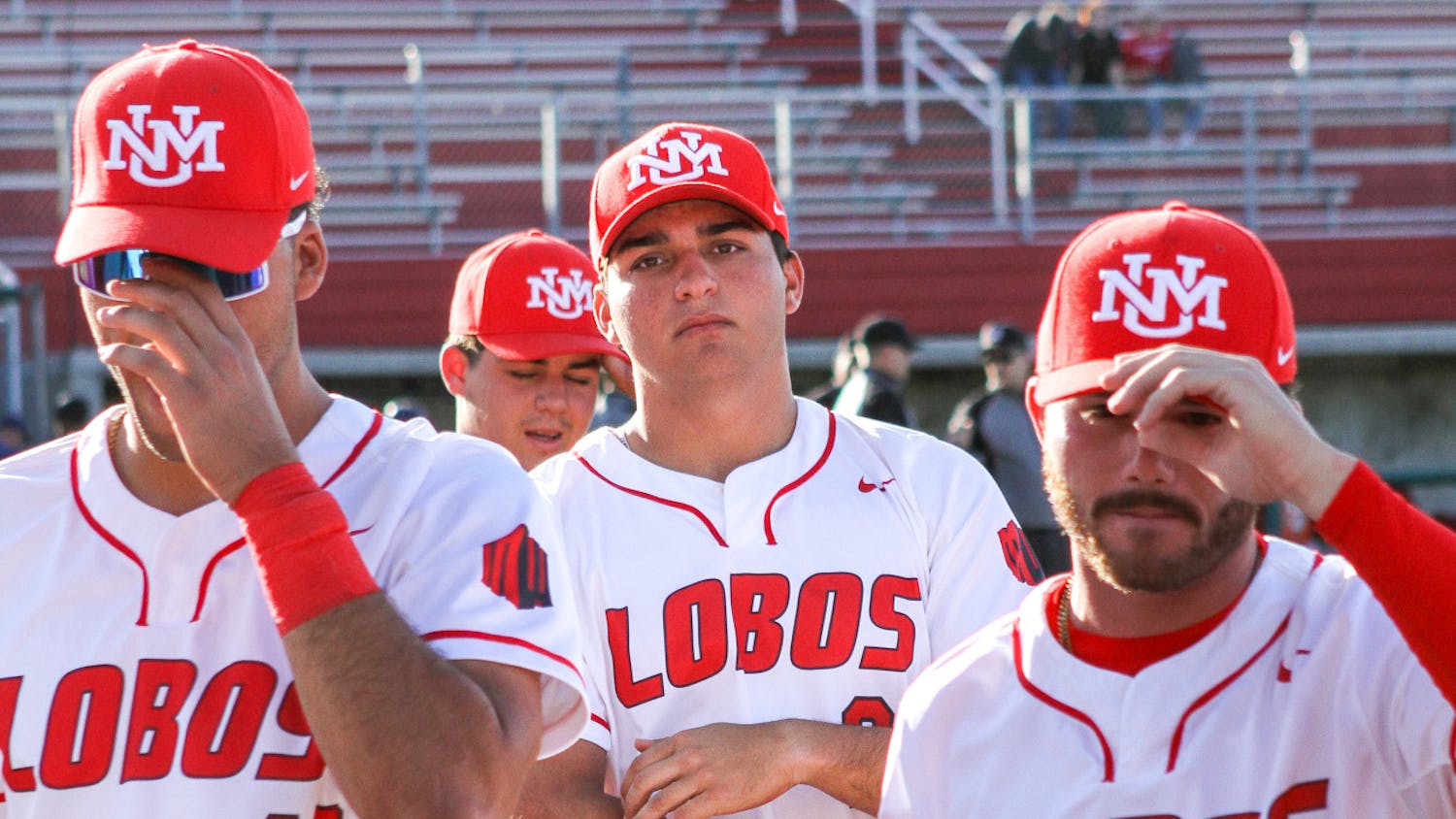On Tuesday morning, 18 students in the Natural Sciences Program sat with jars of water, ice and matches in front of them.
They were going to make clouds.
The matches were lit, dropped in the water and the ice bag placed on top. When the students lifted their bags, small clouds drifted out.
The Natural Sciences Program is designed to teach science concepts to future teachers, with demonstrations that can be used in elementary school classes, covering topics from weather patterns to physics.
Soon, just like those miniature clouds, the program will disappear.
The program was created in the 1990s, said Mel Strong, the last lecturer in the program which has shrunk to a third of its size since 2008.
The classes were going to be cut a year ago until Strong mounted a letter writing campaign, which earned it an extension.
Now that extension is over.
Strong said the College of Arts and Sciences, which the classes are in, doesn’t want to keep them because they serve students in the College of Education, while the College of Education doesn’t want to fund them because the classes are housed in the College of Arts and Sciences.
Jill Okun has been trying to save the classes from being cut by organizing Education students to convince College of Education Dean Hector Ochoa to make the classes required for education students.
“Difficult decisions have been made regarding hiring freezes, departmental budget cuts and many other less than desirable outcomes caused by state budget cuts,” Okun said. “However, I understand that the entire budget for all natural science classes for 2015 to 2016 was $5,000, which is a drop in the bucket for either the COE or the Arts and Sciences department budgets — especially considering the rising cost of tuition.”
Strong also said he has been trying to convince Dean Ochoa, but can’t get a meeting with him.
Get content from The Daily Lobo delivered to your inbox
He’s gotten a letter of support from the New Mexico Partnership for Math and Science Education and tried to make allies with the engineering department to gain enough voices that the program can be saved.
Strong said New Mexico elementary and middle school students typically test in the bottom of the nation for science topics, and while there are many reasons for low test scores, one is that teachers aren’t prepared.
The three classes in this program — life science, physical science and environmental science — are designed to give teachers that preparation by covering all of the science topics that they may need to know to teach elementary or middle school students, Strong said.
“Every day I try to do stuff that the teachers themselves could do in the class that the kids would be excited about science,” Strong said.
Strong said most kids decide if they want to pursue STEM fields by the time they reach middle school, so how well future teachers are trained in science has repercussions for New Mexico’s workforce.
Some Albuquerque Public School teachers who went through the Natural Sciences Program agree with Strong.
Betsy Fulreader, a teacher with the nonprofit Talking Talons Youth Leadership, said the program gave her a new understanding of how energy is used and created.
“The hands-on approach is excellent for students who spend too much of their time buried in textbooks,” Fulreader said. “The Natural Sciences Program is necessary for our changing environment.”
Marnie Ross, a first-year fourth grade teacher, said she finds it distressing that the program is being cut because it gave her the tools to talk with her students in scientific terms and more time to absorb the material than a standard lecture class would have.
Amanda Simmons, who taught fourth grade at Pajarito Elementary School, said her training in the Natural Sciences Program helped her understand the underlying concepts in the APS science curriculum.
“There are two different schools of thought on teacher education,” Simmons said. “One is that a teacher should be an expert in a field of some sort and then that is what they then go on to teach — this would include 400 level biology courses. The second is that a teacher should restudy the basics during their teacher education and would then have a thorough understanding of elementary level concepts. The Natural Sciences Program did both, giving teacher candidates access to the concepts as well as ample opportunities to expand.”
Jeanette Reece, an itinerant teacher of the visually impaired with APS, said the classes allow future teachers to experience what their students will experience, and said that eliminating the program should not be the solution to budget shortfalls.
“It is necessary to be highly qualified in at least one designated area, and the loss of this program will make it harder to achieve this designation in science,” Reece said. “The nation has recently focused on the importance of science, technology, engineering and mathematics in education, and UNM’s inability to recognize the importance of the Natural Sciences Program is tragic.”
Students who have taken the program and are still at UNM were also frustrated that the program is being cut.
Junior education student Trishalana Fairbanks said she thinks UNM is making a huge mistake by cutting the program.
“Science is a hands-on practice, and to cut these opportunities not only diminishes current UNM student’s learning possibilities, but future students that we all will come into contact with after our time at UNM as well,” Fairbanks said. “The current state of science programs in the educational system here in New Mexico is already struggling and fading.”
Geology major Fran Narain said the natural science class she took last semester was the most valuable science class she’s had at UNM because of its hands-on approach.
“Whatever I’m teaching to these guys, I could potentially be reaching 30,000 students over their lifetimes, so it affects way more than just the 30 people in the room,” Strong said.
Cathy Cook is a news reporter at the Daily Lobo. She can be reached at news@dailylobo.com or on Twitter @Cathy_Daily.






